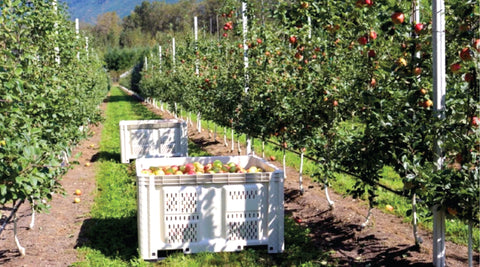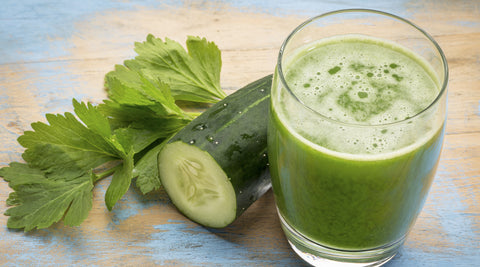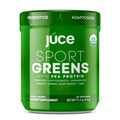Healthy soils provide the essential nutrients necessary to produce healthy crops that nourish and heal. Organic farms sustain and maintain the quality of the ecosystem as compared to conventional farming that depletes the soil. From day one, we've dedicated ourselves to using only certified organic ingredients, harvested from organic farmlands across the country.

The Berger Family, owners and operators of Sauk Farm.
Meet the Bergers: One of Our Organic Apple Suppliers
The best apples are grown in the state of Washington. One of our organic producers is Sauk Farm, located in the foothills of the Cascade Mountains in Skagit County. Family-owned and operated, Carol and Jesse Berger used their life-savings to purchase the 100-acre farm over a decade ago. The first crop planted was spinach. Son, Griffin, attended many farmers markets as a teenager, selling the farms vegetables. He attended Washington State University, studying plant sciences to help his parents run the farm. Today, Sauk Farm grows peaches, plums, grapes, and a variety of apples.
What it Means to be an Organic Farm
Providing the highest quality produce and knowing it was grown in the most natural way is the foundation of how Sauk Farm crops are grown. The farm has been certified organic since 2016 and expects its regenerative organic certification soon. Certified organic farms are held to the highest standards of farming that's free of synthetic additives like pesticides, chemical fertilizers, and dyes.
Monitoring Soil & Plant Quality
Soil moisture is monitored weekly and is adjusted based on soil moisture probes and weather forecasts. This ensures water isn't wasted. In addition, all trees and vines are irrigated through drip tubing which reduces water loss from 60% to 3% when compared to traditional sprinkler systems.
Every spring, a strip of horse manure compost is spread down all our tree rows. This helps retain soil moisture, promote insect biodiversity, provide habitat for beneficial insects, improve nutrient cycling, increase soil microbial levels, and reduce the need for fertilizers.
Between rows of trees and vines a variety of cover crops are planted from year to year. Cover crops include mustard, rapeseed, red clover, white clover, crimson clover, barley, and rye. Cover crops provide a variety of benefits depending on the species. Benefits can include nitrogen fixation, breaking up compaction, adding organic matter to the soil, moisture retention, fumigation, attracting and supplying a food source for beneficials, and preventing nutrient leaching into ground water. Insects are also monitored through lab testing.
WHY BUYING LOCAL MATTERS
Buying local matters because when you buy local you are supporting and enabling a sustainable economy: promoting business and people getting and keeping jobs. Buying local also reduces the carbon footprint and air pollution as it decreases the need for vehicle and ship traffic.
The Berger family sells their crops to local food co-ops and groceries, like Haggen and Community Food Co-op. They have also created their our own products from the crops grown on the farm, which include apple and grape ciders, dried apples, apple and grape verjus, and apple and grape powders. The product gaining the most attention—and that the family is most proud of—is the apple powder. And, of course, it is our favorite too!
JUCE Greens Superfood (Harvest Apple)
- Promotes cleansing and detox
- Helps alkalize
- Immune support




